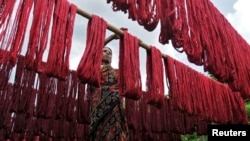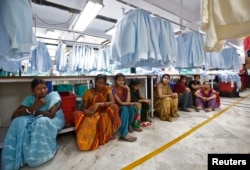A letter from six women at a spinning mill in southern India, describing the sexual harassment they face at work and asking for help, exposes the widespread exploitation of women in the multi-billion-dollar textile industry, campaigners said.
"He forces himself on us, constantly hugging us and squeezing our breasts," the women write, describing the behavior of their male supervisor. "Any worker who resists his advances loses part of her salary. We need this job and don't know who to talk to about the abuse we face every day. Please help us."
Sent to the social welfare officer in Dindigul, a district in the southern state of Tamil Nadu, the eight-page letter dated Aug. 29 is a plea for help from abused and exploited women, rights campaigners said.
"Women normally share their experiences only after quitting their jobs," said S. Thivyarakhini of the all-women Tamil Nadu Textile and Common Labor Union. "This is the first time we have such raw details of ongoing exploitation. The letter has exposed the underbelly of the textile industry in the region."
The mill management said they were unaware of the letter and had not received any official complaint.
"There were unsubstantiated allegations against the same person around a year back by a woman worker," said K.R. Shanmugavel, senior manager at the Rama Spinning Mills. "We gave him a warning and also terminated the [employment of the] woman worker to avoid further problems."
India is one of the world's largest textile and garment manufacturers. Many of the workers employed in this $40-billion-a-year industry are trapped in debt bondage, face abuse or are forced to work long hours in poor conditions, activists said.
Traditionally, the dyeing units, spinning mills and apparel factories have drawn on cheap labor from villages across Tamil Nadu to turn the cotton into yarn, fabric and clothes, most of it for Western high street shops.
More than 2,000 units employ an estimated 300,000 people, most of them young women from poor, illiterate and low-caste or "Dalit" communities.
There are around 100 women working in the Rama Spinning mills near Nallamanarkottai village in Dindigul district.
"There is constant use of vulgar language and other male workers are also encouraged to seek sexual favors from us," the letter states. "Some desperate women go along with the exploitation and they are exempt from overtime work. But those of us who resist are forced to complete the work orders. Any show of protest results in wage cuts."
The women said that they were unable to communicate their problems with the mill owner, who lives in a different city and relies on the manager for feedback.
"We don't mind the wage cuts and the overtime work. It is the sexual harassment that we cannot bear," the women wrote in the letter. "It is something we cannot talk to our families about. We dread going to work every day."
Dindigul social welfare officer G. Shanti told the Thomson Reuters Foundation that they were in the process of putting together an inquiry committee to inspect the mill premises and look into the allegations.






